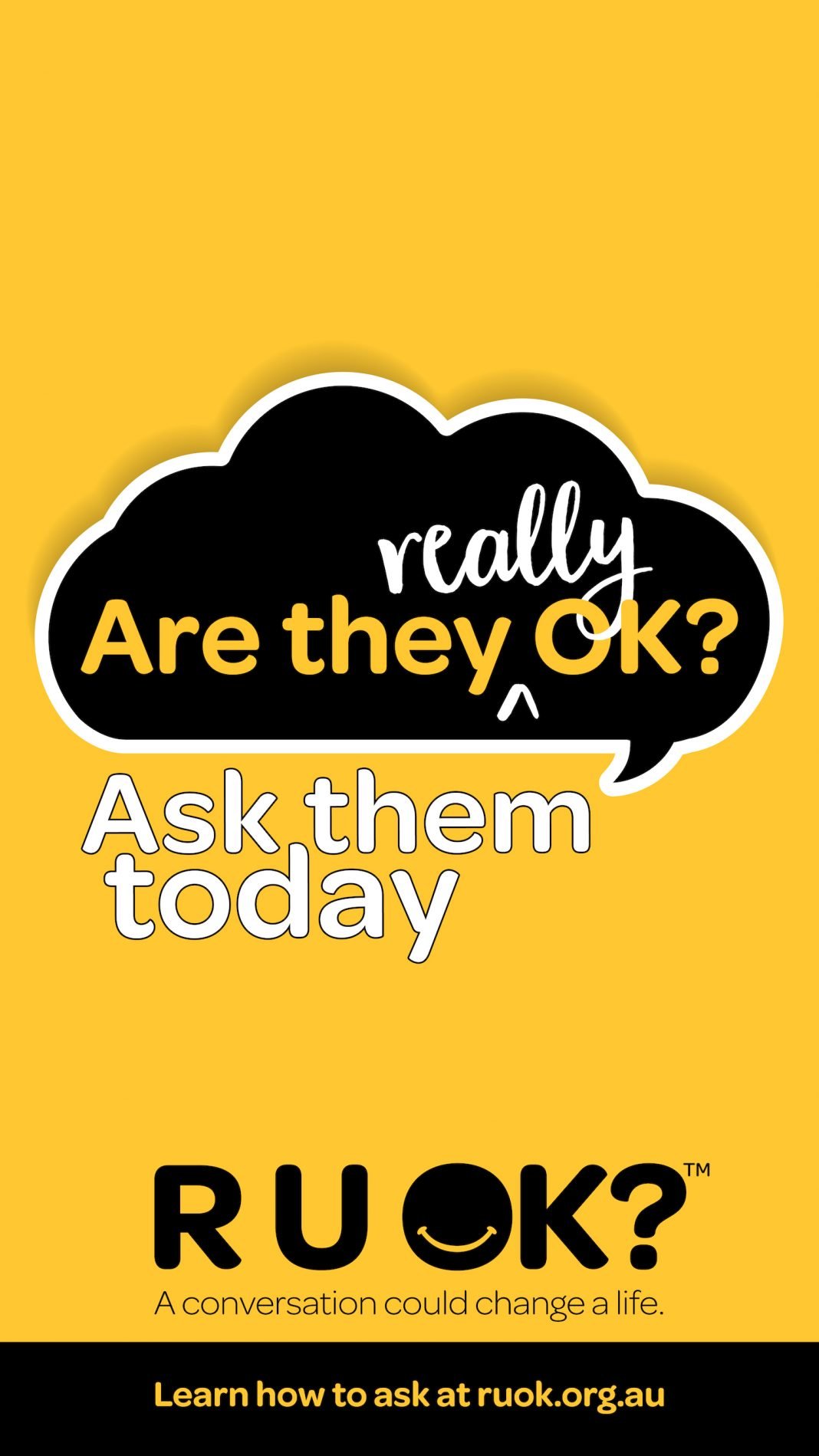Are they really OK? Ask them today and every day
Australians across the nation will today gather in person and virtually to mark R U OK?Day, a national day of action and a reminder that every day is a day to start a meaningful conversation with the people in our world.
Thousands of events and activities will be hosted by social and sports clubs, community groups, workplaces, schools and suicide prevention networks, championing the message “Are they really OK? Ask them today” which calls on all Australians to make asking “are you OK?”, a part of their everyday.
“The ups and downs of life can affect each of us differently. Sometimes it won’t be obvious that someone is struggling, but having the support of family, friends and close colleagues can help us better navigate the challenges that come our way,” said R U OK? CEO, Katherine Newton. “Don’t wait until someone is visibly distressed or in crisis before you ask. If you ask them in a genuine way, your support can make a difference whatever they are facing.”
“In a time when so many of us are feeling fatigued by the pandemic, we want to remind and reassure Australians that there is something we can all do to support those in our world, and as those closest to them we are often in a position to do so.”
“R U OK?Day is a reminder to think about how the people in our world are really going, find time to make a moment meaningful and have a conversation” said Ms Newton.
Research[1] has found 80% of those who have recently spoken to someone about something that’s troubling them feel more supported and cared about, and 72% say it helped them feel better about themselves and their situation.
Given the continued restrictions on face-to-face interaction across certain areas of the country, R U OK?Day 2021 will have a large presence across all major social media channels with activations taking place across Facebook, Twitter, Instagram, LinkedIn, Snapchat, Twitch, Pinterest, TikTok, YouTube and Messenger. The gaming community have also embraced the R U OK? message with Twitch creators across Australia and New Zealand hosting streams to share information on when and how to ask R U OK? throughout September.
Many events will take place online including the ‘2021 R U OK?Day Online’ a free webinar hosted by R U OK? Ambassador Sam Mac.
‘2021 R U OK?Day Online’ will run for an hour from 12:30 AEST, and will feature conversations with real people sharing their experiences and advice on knowing when and how to ask ‘are you OK?’ and navigate a conversation that could change a life.
“R U OK? is a cause that’s very close to my heart. I lost a friend to suicide over a decade ago. I have such a sharp, vivid memory from when I got the call about Richard and remember almost instantly wanting to do something to help. I got involved with R U OK? and my mission is pretty simple – to let Australia know there is support and that talking about it is a healthy thing,” says Sam Mac, R U OK? Ambassador and Media Personality.
“I’d encourage everyone to join today’s free online event, or download the free conversation guide on the R U OK? website. Empower yourself with these skills, because asking “are you OK?” when someone’s struggling is something we can all do to show the people in our world we care.”
This year has seen an increased demand from workplaces, schools and the public for practical tools on how to have an R U OK? conversation. In the last year R U OK? have seen a 32% increase in resource downloads from the website, compared to the same period the previous year.
R U OK? resources are now available in eight other languages and to support at-risk demographics such as Aboriginal and Torres Strait Islander communities, the LGBTIQ+ community and those living in regional and remote Australia.
Curriculum aligned resources have been updated for Primary, Secondary, University and TAFE students and a new video has been produced with Life Education’s iconic children’s health figure ‘Healthy Harold’ referencing the challenges of online learning, missing people and how we can support each other.
Resources for educators, communities and workplaces are all free, available to download from the R U OK? website. Resources guide you through the signs it might be time to have a conversation, getting ready to ask, the simple steps to having an R U OK? conversation, advice on managing difficult reactions, what to say if they reply “no, I’m not OK” as well as how to respond if they reply “I’m fine.”
“People exposed to R U OK? are six times more likely to reach out to someone who might be experiencing personal difficulties compared to those not exposed to the campaign[2],” says Rachel Clements, Director of Psychological Services, Centre for Corporate Health
“We want all Australians to #StayConnected not only on R U OK?Day, but every day in homes, schools, workplaces and communities,” said Ms Clements. “The people in our world won’t always tell us they need support so it’s up to us to make asking how they’re really going a part of the fabric of our relationships. That question and a meaningful conversation could change a life.”
R U OK? is providing guidance on the times people might need to be asked ‘are you OK?’ and how you can make a moment meaningful through having an R U OK? conversation.
All R U OK? resources are free and available to download at: ruok.org.au
For support at any time of day or night, call Lifeline on 13 11 14.


